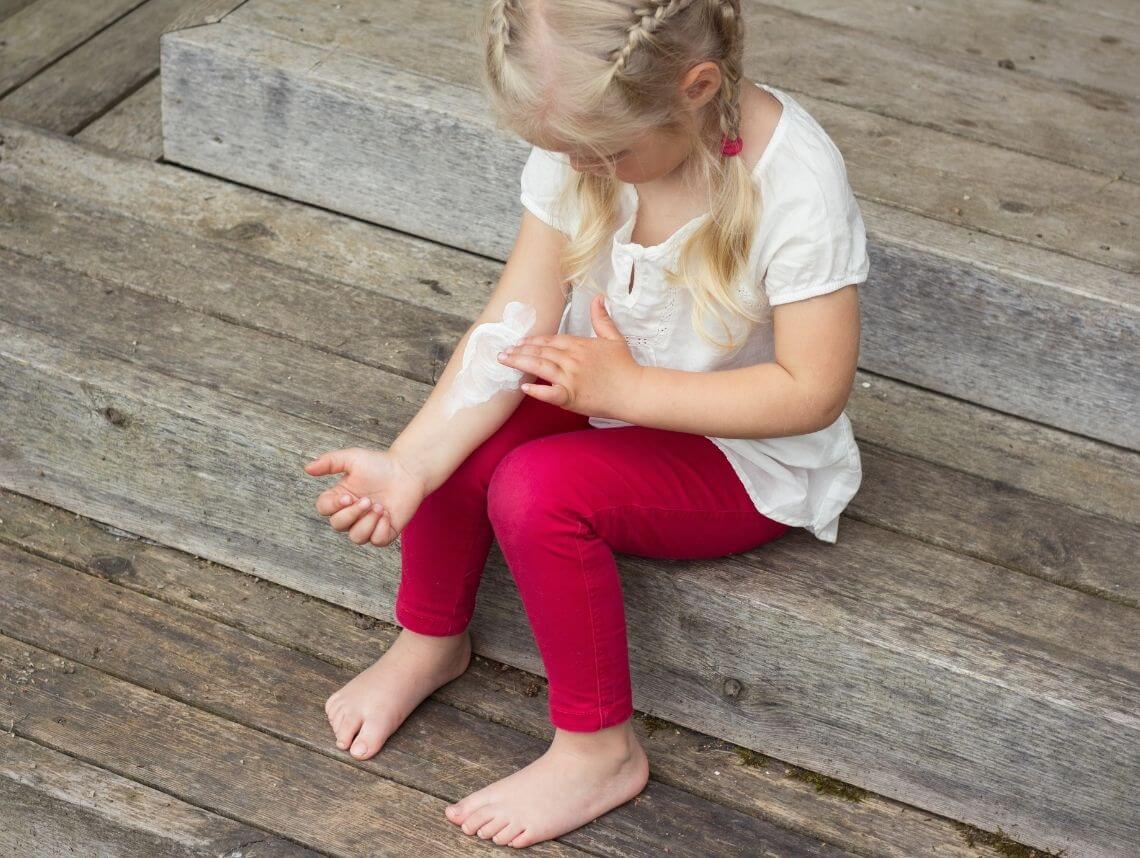Although the dry, itchy skin and rashes that come with eczema can be uncomfortable for children, parents are very often relieved to find this condition is very manageable with care. While there isn’t currently a cure for eczema, and flare-ups can occur periodically, children who develop this condition generally have a positive long-term outlook.
To help you better understand the causes, signs, and treatments for eczema in children, we’re happy to share this guide. By being as educated as possible as a caregiver, you can take a more proactive role in helping your child or loved one find relief and a better quality of life.
Also called atopic dermatitis, eczema is a skin condition that irritates the skin, causing dryness, itchiness, and a visible red rash. Eczema in children is very common, particularly in infants, but it can also happen in teenagers and even adults. Because it is usually a chronic condition, eczema flare-ups can occur periodically throughout childhood and adolescence.
Eczema Causes
Doctors are still working to fully understand the underlying causes of eczema and there is not currently a cure. Normally, the skin retains moisture, which helps to protect it from irritants such as bacteria and allergens. Researchers suspect a genetic variation causes the skin to be unable to sufficiently retain moisture, resulting in the telltale signs of eczema in children and other patients.
Eczema Risk Factors
Potential risk factors for eczema development in children are hay fever and asthma, either in the child or a relative. Additionally, children with a parent who has eczema are more likely to have the problem themselves.
Symptoms of eczema can vary, especially according to age. For example, infants with eczema are most likely to have a rash and itch on their scalp, forehead, and cheeks. Older children and teenagers tend to get symptoms in areas including the elbows, knees, neck, inner wrists, and ankles.
Eczema Signs and Symptoms
Overall, the most commonly reported symptoms for eczema in children are:
- Dry skin
- Redness, or a rash
- Red to brown patches in problem areas of the skin
- Scaly, bumpy skin that can become leaky and crust over
- Sensitive and irritated skin
- Sometimes more noticeable at night
- Periodic flare-ups
Parents of children with signs of eczema are advised to see a doctor for treatment, especially if the condition is causing difficulty sleeping, performing daily activities or there are any signs of visible infection, such as pus or swelling.
Diagnosing Eczema in Children
There is no lab test to positively identify eczema as the source of symptoms in children. Pediatricians will generally perform a review of medical history, visibly inspect the rashes and skin patches, and ask questions about symptoms, diet, and activities to verify eczema or rule out another condition.
Treating Eczema in Children
Treatment will vary depending on the age of your child and specific symptoms, but most treatment plans will include some combination of:
- Topical medication, including corticosteroid creams to control itching and calcineurin inhibitors to promote skin repair
- Antibiotics, if there is a skin infection present
- Oral steroids in more severe cases
- Light therapy, or exposing the skin to controlled sunlight or UV light, may help in some cases
- Wet dressings, which are a method of using wet medicated bandages
- Counseling and biofeedback, for help with emotional problems and controlling certain behaviors such as an excessive diet
At-home care and prevention measures can also help relieve symptoms and potentially prevent flare-ups. These can include:
- Taking shorter baths or showers in warm, not hot, water
- Avoiding extreme temperatures
- Keeping fingernails short to avoid irritating skin
- Avoiding or reducing certain foods that may be associated with flare-ups
- Staying hydrated to keep the skin as moist as possible
- Wearing soft breathable clothing, and avoiding harsh fabrics such as wool
- Avoiding stress as much as possible
- Keeping known allergens and irritants out of the home, especially tobacco smoke
The most severe cases of eczema in children can involve prolonged and intensive treatment measures. In these situations, many families turn to pediatric home health services. An experienced home health aide understands the needs of children with eczema and can help with medications, dietary needs, accompaniment to appointments, and many other care considerations. This is especially beneficial to families with busy schedules or single parents.
Contact Care Options for Kids for Home Health Care in Florida
It can be hard to balance your time between work, home, and caring for a child. That’s why our team of skilled professionals at Care Options for Kids is here to help. We have been enforcing precautionary measures and following the Centers For Disease Control (CDC) guidelines for COVID-19 to ensure the safety and health of our clients and employees.
Our home health care services offer support in the comfort of your home. We refer loving and competent Our home health care services offer support in the comfort of your home. We refer loving and competent nurses, Certified Nursing Assistants (CNA), or Home Health Aides (HHA) to provide customized care for families — from a few hours a day to around-the-clock supervision. Contact us directly to speak with a home health care professional or request a free in-home assessment. Together we can determine the best plan of action to keep your loved ones happy and healthy. Contact us directly to speak with a home health care professional or request a free in-home assessment. Together we can determine the best plan of action to keep your loved ones happy and healthy.
If you or a loved one are considering Pediatric Home Health Care Services in Florida, contact the caring staff at Care Options for Kids. Call today at (888) 592-5855.






